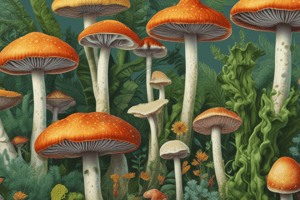Podcast
Questions and Answers
Which type of algae is capable of photosynthesis and has a green pigment called chlorophyll?
Which type of algae is capable of photosynthesis and has a green pigment called chlorophyll?
- Prokaryotic algae (correct)
- Eukaryotic algae
- Red algae (rhodophytes)
- Brown algae (phaeophytes)
What is the primary role of algae in aquatic ecosystems?
What is the primary role of algae in aquatic ecosystems?
- Regulating the temperature of the water
- Filtering the water to remove impurities
- Serving as a home for marine organisms
- Providing energy for other organisms through photosynthesis (correct)
What is the ecological role of algae in nutrient cycling?
What is the ecological role of algae in nutrient cycling?
- Filtering the water to remove impurities
- Regulating the temperature of the water
- Maintaining the balance of nutrient availability (correct)
- Serving as a food source for marine organisms
What distinguishes eukaryotic algae from prokaryotic algae?
What distinguishes eukaryotic algae from prokaryotic algae?
Which group does green algae (chlorophytes) belong to?
Which group does green algae (chlorophytes) belong to?
What is the method of growing algae in a nutrient-rich solution, without soil?
What is the method of growing algae in a nutrient-rich solution, without soil?
What is an essential characteristic of prokaryotic algae?
What is an essential characteristic of prokaryotic algae?
Which type of bioreactor uses artificial lighting and temperature control to optimize algae growth?
Which type of bioreactor uses artificial lighting and temperature control to optimize algae growth?
What are algal blooms?
What are algal blooms?
What are the economic impacts mentioned in relation to algal blooms?
What are the economic impacts mentioned in relation to algal blooms?
What is the primary commercial application of algae mentioned in the text?
What is the primary commercial application of algae mentioned in the text?
What is the negative impact of algal blooms related to human health?
What is the negative impact of algal blooms related to human health?
Which type of algae growth involves large bodies of water in warm climates?
Which type of algae growth involves large bodies of water in warm climates?
Flashcards are hidden until you start studying
Study Notes
Articles About Algae
Algae: What Are They?
Algae is a diverse and widespread group of organisms that encompasses various species of plants, bacteria, and protists. They are mostly aquatic and are found in various habitats, from freshwater ponds to saltwater oceans. Algae play a crucial role in Earth's ecosystem, and they are essential for the survival of many other organisms.
Types of Algae
There are three main types of algae:
- Prokaryotic algae: These are bacteria that have a green pigment called chlorophyll and are capable of photosynthesis.
- Eukaryotic algae: These are multicellular and are divided into three groups: red algae (rhodophytes), green algae (chlorophytes), and brown algae (phaeophytes).
Ecological Importance of Algae
Algae have several ecological roles, including:
- Primary producers: Algae are the primary producers in aquatic ecosystems, providing energy for other organisms through photosynthesis.
- Food source: Algae are a primary food source for many marine organisms, including fish and invertebrates.
- Nutrient cycling: Algae help recycle nutrients in ecosystems, maintaining the balance of nutrient availability.
Algae Cultivation
Algae cultivation is a growing industry, with several techniques used to cultivate algae. These include:
- Open ponds: These are large bodies of water where algae is grown, usually in warm climates.
- Closed systems: These are bioreactors that use artificial lighting and temperature control to optimize algae growth.
- Hydroponics: This is a method of growing algae in a nutrient-rich solution, without soil.
Commercial Uses of Algae
Algae have various commercial applications, including:
- Food: Algae can be used as food for humans and animals, providing essential nutrients and proteins.
- Industrial products: Algae can be used to produce a wide range of products, such as biofuels, bioplastics, and cosmetics.
- Pharmaceuticals: Algae are a source of several pharmaceutical compounds, including antiviral and anticancer agents.
Algal Blooms and Their Effects
Algal blooms are the rapid growth of algae in water, often resulting in discoloration and oxygen depletion. These blooms can have several negative effects, including:
- Water quality: Algal blooms can lead to poor water quality, which can harm other aquatic organisms.
- Human health: Some algal blooms can produce toxins that can be harmful to humans if ingested or inhaled.
- Economic impacts: Algal blooms can have significant economic impacts, such as the loss of tourism revenue and the cost of remediation.
In conclusion, algae are diverse organisms with significant ecological and commercial importance. They play a crucial role in aquatic ecosystems and have numerous applications in various industries. However, algal blooms can have negative impacts on water quality and human health, highlighting the need for careful management and monitoring of algal populations.
Studying That Suits You
Use AI to generate personalized quizzes and flashcards to suit your learning preferences.




